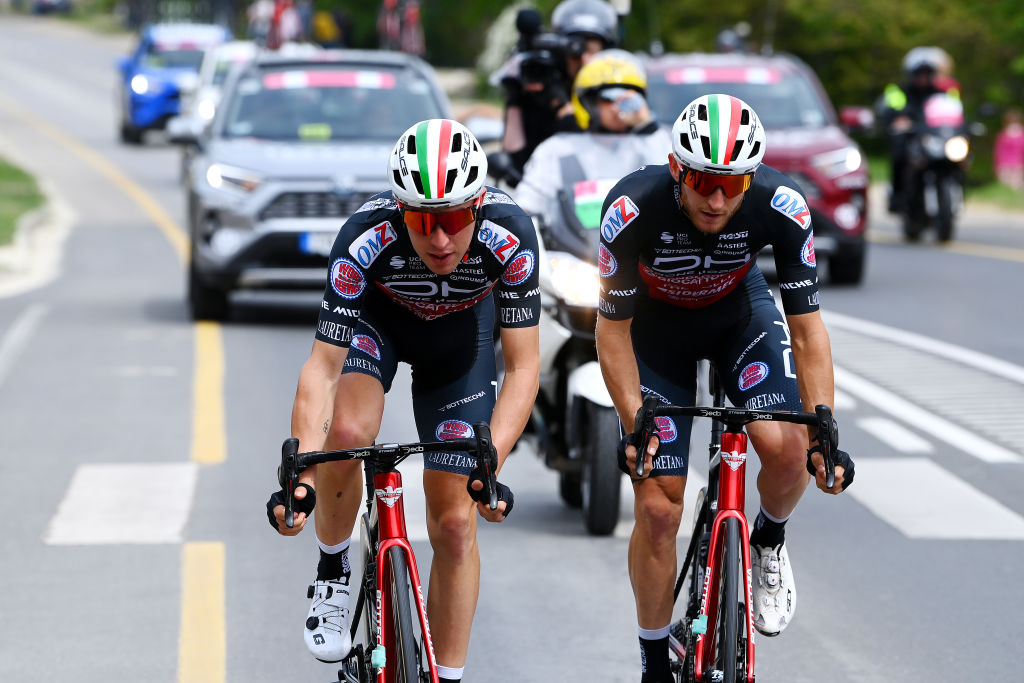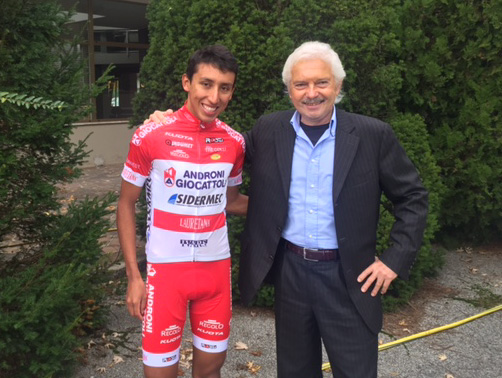Drone Hopper-Androni on 'standby' as Savio seeks new sponsor to ensure survival
Italian manager warns WorldTour expansion would signal the end of ProTeams

Gianni Savio enunciated the word carefully and deliberately: "Traghettare." It’s a word he finds himself using a lot these days, and that’s a worry.
Its literal translation is "to make a crossing by boat" and Savio reached repeatedly for that nautical image on Padova’s Prato della Valle this week as he described his attempts to keep his Drone Hopper-Androni team afloat for another season.
All seemed calm last winter, when Savio unveiled Drone Hopper as his new sponsor. A four-year deal was agreed and signed, and there was even lofty talk of trying to earn promotion to the WorldTour in that time.
"They came in with big ideas," Savio told Cyclingnews ahead of the Giro del Veneto this week. "We said: ‘Careful, let’s move gradually'."
The waters have grown rather stormier since, as Drone Hopper, the Spanish drone manufacturer, has floundered and failed to live up to its financial pledges.
The mid-season transfer of Jefferson Cepeda and Andrea Piccolo to EF Education-EasyPost provided short-term relief, with the triggered release clauses bridging a gap in the team’s finances, ensuring salaries for the remaining riders and staff could still be paid. Long-term sub-sponsor Sidermec provided assistance, too, to help reach the shore of season’s end.
In August, however, Savio told all his riders and staff that they were free to seek employment elsewhere. As the racing calendar draws to a close in Italy and Malaysia this week, the situation is grave.
Get The Leadout Newsletter
The latest race content, interviews, features, reviews and expert buying guides, direct to your inbox!
"They’re good people at Drone Hopper but, unfortunately, it’s a start-up company,” Savio said. “They would like to continue sponsoring us, but they don’t have the means at the moment. They tell me they’re starting to earn money and that they will be able to pay us, but I said I need a guarantee."
Per UCI rules, Drone Hopper deposited a bank guarantee roughly equal to a quarter of the team’s wage bill at the start of this season. Savio said that a bank guarantee of the same value would also be deposited for next season, given that he holds a contract with Drone Hopper through the end of 2025, but that sum of money would not suffice to maintain a team with ambitions of competing at the Giro d’Italia.
"We have a bank guarantee of €350,000, but that doesn’t bring you far with a team at this level and I certainly don’t want to tie myself to that risk," Savio said. “That’s the situation we’re in – we’re in a situation of standby. It’s not true that we’ve decided not to continue, but it’s also not certain that we will continue.
"Given that Drone Hopper is in difficulty, we have to find an alternative solution – that is, a replacement sponsor. Otherwise, we won’t continue because it’s continuous stress. You can’t keep the squad going properly with all these economic issues to worry about."
Giro
Savio has been managing cycling teams since the mid-1980s, and his current outfit has existed since 1996. Over the years, the team’s jerseys have always been cluttered with the branding of a variegated coalition of sponsors, with past backers including Italian saddle companies, Colombian soft drinks, and even the Venezuelan state.
Yet despite that flux of financiers, the structure itself remained remarkably stable. This is, Savio said, the first time he has reached the end of a season unsure as to whether his team would continue into the next.
“It’s stressful,” Savio said, before breaking out some gallows humour: “But stress is a friend of mine that accompanies me every day.”
As things stand, all Drone Hopper riders – from Eduardo Sepulveda, in action at the Tour de Langkawi, to Umberto Marengo, on the offensive at Serenissima Gravel – are free to seek employment elsewhere. On Friday, Natnael Tesfatsion confirmed his move to Trek-Segafredo, but in a market where a rider like Alessandro De Marchi, maglia rosa on last year’s Giro, is still without a contract, many will require a minor miracle to find a new team at this level.
"Two and a half months ago, we held a conference call and we told everybody – riders, directors, soigneurs, mechanics – that they were free to sign with other teams," Savio said. “Almost everybody’s contract was up at the end of this year, but it was about being correct. If we continue the team and they don’t find a place somewhere else, then we’ll talk. But nobody can say that he lost a possibility because Savio led him on.”

All the while, the 75-year-old has been trying to drum up interest from new sponsors to support his team into 2023. So far, nothing concrete has materialised. “There are contacts,” he said, adding that he might even consider dropping down to Continental level for a year until a more substantial backer emerged.
“We’re even willing to traghettare for a year as a Continental team,” Savio said. “That would mean having a team of smaller dimensions, perhaps made up of young riders. But it would have to be a real project, not just any old Continental team with riders from this place or that.”
In years past, Savio’s great bargaining chip has been the prospect of Giro d'Italia participation. Back when RCS Sport gave a wildcard berth to the Coppa Italia winners, it was sometimes even guaranteed.
There is no such lifeboat this time out. As things stand, RCS Sport has only three wildcards to distribute, a number that could drop further if the UCI were to expand the WorldTour to 20 teams in 2023 per the wishes of the teams relegated from the top flight this season.
“The other day, I spoke with a director from an important foreign company, and he said to me, ‘Are you sure of doing the Giro?’ And I said, ‘We’re not even certain of having a team…',” Savio said.
“If there are 20 WorldTour teams, that will be a big, big problem for the ProTeams. I’d say it would be end of the ProTeams.”

Barry Ryan was Head of Features at Cyclingnews. He has covered professional cycling since 2010, reporting from the Tour de France, Giro d’Italia and events from Argentina to Japan. His writing has appeared in The Independent, Procycling and Cycling Plus. He is the author of The Ascent: Sean Kelly, Stephen Roche and the Rise of Irish Cycling’s Golden Generation, published by Gill Books.